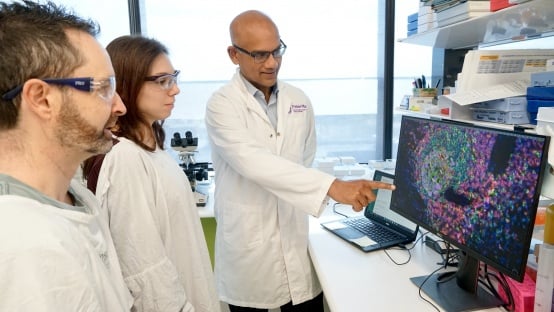Breakthrough
25 November 2022
Cancer can be stressful and difficult. It affects not only your physical health but can also have major impacts on your emotional wellbeing, quality of life, family and financial situation
Australia’s lung cancer statistics read like bad news but, thankfully, they are only half of the story. Despite being the fifth most common cancer (behind prostate, breast, melanoma and bowel cancer in that order), lung cancer remains Australia’s No.1 cause of cancer deaths. Another 8,664 Australians lives will be lost to lung cancer this year, well above the next placed bowel cancer (5,326 deaths) and pancreatic cancer (3,531 deaths). The other, more positive half of the story is that after decades in which lung cancer’s long-term survival rate seemed stuck around 10% finally there are signs of progress. While still at the back of the pack (e.g. prostate cancer’s five-year relative survival rate is 96%), five-year survival for lung cancer improved to 22% over the past decade and further gains are expected. Peter Mac’s Professor Ben Solomon - who treats lung cancer patients and heads a lab advancing novel therapies - points to an expanding array of new, targeted drugs that are coming online. “These targeted drugs, which have become standard-of-care relatively recently or are advancing through clinical trials, work in patients with specific molecular subsets of lung cancer,” says Prof Solomon. “There are still many questions as to how these drugs together with new immunotherapy treatments can best be used alongside or replace our conventional chemotherapy, radiotherapy and surgery. “But the next generation of lung cancer treatment is here now and giving us hope of better outcomes for these patients, and further gains in long-term survival, into the future.” View a list of some of these new drugs, and their targets. In late October this year, Prof Solomon discussed results of a clinical trial of the targeted drug repotrectinib at a major Molecular Targets and Cancer Therapeutics conference in Barcelona. The trial involved patients with non-small cell lung cancer and who were ROS1-positive, indicating they carried a gene fault that promotes uncontrolled cell growth. Among patients not previously been treated with a similar drug (and so may be resistant), 79% showed a positive response to repotrectinib. Importantly, there were also signs the drug was active in lung cancers that had spread to the brain - a group for whom there are few effective treatment options. Prof Solomon is also co-lead of the ASPiRATION trial which is providing comprehensive genomic testing to 1,000 newly diagnosed patients with lung cancer across Australia. This identifies if a patient has any of a wide array of genetic targets (including ROS1 but many others) for which a targeted drug may be available, or in clinical trials. This enables patients who are not responding well to conventional treatments to be diverted to drugs more likely to work for them, an approach known as “precision medicine”. “Increasingly we see that understanding the genetic drivers of lung cancer in each patient is the key to improving outcomes,” Prof Solomon says. “Targeted drugs, while not yet a cure, are extending life and improving quality of life for people with lung cancer and we’re starting to see the benefits in terms of improved long-term survival.” November is Lung Cancer Awareness Month. Find out more about Lung Cancer Awareness Month and how to spot the symptoms

